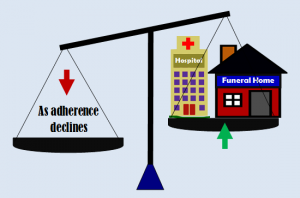Stats indicate 6 in 10 don’t take medications as directed including forgetting and intentionally cutting the dose or stopping a medication early. Psychiatrist Dr. Jay Pomerantz observes, “Pharmaceutical companies seem to focus all their advertising and free-sample offers on attracting potential new patients, with almost no attention focused on the problem of premature discontinuation of therapy by persons already taking their medication. From a business standpoint, this seems like a missed opportunity. The revenue stream from ongoing prescriptions can be just as important, or even more important, as sales to new patients.”1
Consequences for Patients and Pharma
Consequences for Patients and PharmaSecondary nonadherence is even higher and an especially concerning problem for serious chronic conditions with few obvious symptoms such as hypertension and high cholesterol where failing to refill can lead to hospitalization or fatality. American Academy of Family Physicians (AAFP) Director Rebecca Jaffe, M.D., M.P.H., called poor medication adherence a "leading driver of hospital admissions and readmissions" and the cause of at least 125,000 deaths a year.2

This is a problem on which pharma should be more focused. Nonadherence is often dangerous for patients but also from a business standpoint as it represents over 1 billion in lost prescriptions each year. Remember, NPs / PAs and nurses are often the ones handling patient education and medication questions so you can and should provide them tools designed to increase adherence.
Are you doing enough to positively affect HCP patient communication and adherence?
Please subscribe to automatically receive a notice and link so that you don’t forget to read the next topic: “Infographic of Medication Adherence”
